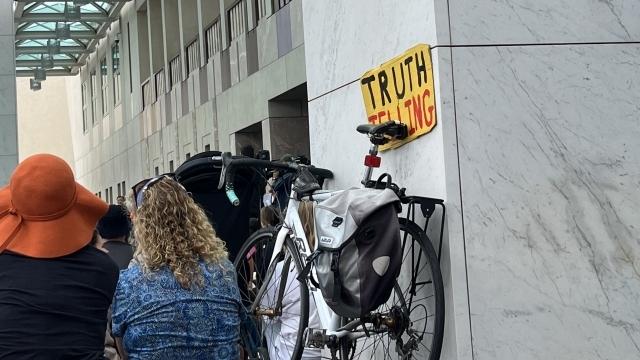
Image (c) Mati Keynes
Does Australia have a listening problem?
Since colonial occupation, Indigenous people have consistently and publicly articulated truths about settler colonialism. They have demanded an accurate accounting of European occupation and violence, as well as faithful and nuanced treatment of their own histories and cultures on the continent. In contrast, the settler nation’s foundation myth of a peaceful birth has been followed by centuries-long cycles of silence, denial, ignorance, and forgetting. Historian Anna Haebich described this as a kind of collective amnesia, truncated by moments of ‘sudden’ awareness of crimes such as child removal and frontier violence, often followed by liberal expressions of outrage, guilt, and shame. Vital truths have already been told, including through significant government-sanctioned inquiries, yet these have not been deeply heard, nor combined with the political action required to affect social transformation.
Recent imperatives for truth-telling, such as the Uluru Statement, necessitate a confrontation with Australia’s listening deficit. One way to explore this is to consider how different modes of truth-telling embody divergent assumptions about pedagogy. After all, education broadly, its failures and potentials, are central to the wider political imperative, post-Voice referendum, to seek truths, to hear and to listen. In this paper, Mati will explore different pedagogical assumptions about knowledge, listening, and learning in the context of truth-telling, including their relations to visions of social transformation. This presentation will share Mati’s ongoing research on the history and theory of truth-telling in education, through their current work as AuSI/HRC Visiting Scholar in Australian Studies at the Australian National University.
Speaker:
Dr Mati Keynes is a non-Indigenous scholar living and working on Wurundjeri and Ngunnawal lands. Trained as an historian, Mati is currently McKenzie Postdoctoral Research Fellow in the Faculty of Education at the University of Melbourne. Mati is leading an international project on truth commissions, exploring how school communities in Australia and the northern Nordic states are engaging with truth-telling. Mati’s co-authored book (with Dr James Miles) on education in cultures of redress will be published with Bloomsbury in 2024, and their edited book Historical Justice and History Educationwas published with Palgrave in 2021.
Dr Keynes comes to the ANU as the 2024 HRC-AuSI Visiting Fellow.
Location
Speakers
- Dr Mati Keynes, University of Melbourne
Contact
File attachments
| Attachment | Size |
|---|---|
| Work_in_Progress_KEYNES_March_26_2024.pdf(668.14 KB) | 668.14 KB |